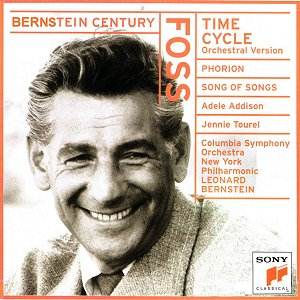Of
composers great and small I have met or spoken to, Lukas Foss
is the only one I actually had an argument with. I had chided
him for performing Bach on the piano instead of the harpsichord,
but he declined to repent. I was in the audience at the debut
concert of the Improvisation Chamber Ensemble, and at the premier
of Time Cycle with the composer conducting in the original
version (heard here) with improvised interludes by the Ensemble.
Later performances often omitted these interludes.
This
disk of Foss’s ‘Greatest Hits’ is very curious in one way: There
are 213 photographs of Leonard Berstein in the program booklet,
and one on the face of the disk — but none of Lukas Foss, which
would lead most casual readers to assume that Foss looked exactly
like Bernstein. He didn’t. One is almost surprised that Foss’s
name is on the cover in bigger print than Bernstein’s, but it’s
turned sideways as if to compensate.
Foss
was one of those composers victimized by the mid-20th century
academic dictum that every work must create and thoroughly explore
a completely original tonal, textural, and stylistic universe,
never to be reused in any subsequent work. The idea of writing
more than one work in the same style was considered akin to hebefrenic
dementia. It was sufficient to discredit a work from nomination
for a Pulitzer Prize (which Time Cycle did win), from public
performance or even from any serious critical attention whatever
merely by citing that it was ‘not original,’ meaning it utilized
stylistic elements which had been used before, even if by the
same composer in his own music. Ironically this was the time that
saw the exploration through recordings and public performances
of the complete catalogues of Haydn, Mozart and Vivaldi, composers
whose approach was at the absolute opposite pole from this idea.
Also ironic was that this demand of absolute originality was interpreted
to require the imitation of Schoenberg, that is use of serial
techniques. Hence Time Cycle. If Foss had flourished 50
years later, I think he would have been a happy neo-post-romantic
composer and written many beautiful works, sounding perhaps like
his Song of Songs, but after producing that masterpiece,
he could never do anything like it again. He’d ‘done that.’
At
the time Phorion was produced, the cliché of building
"original music’ out of fragmentary scraps of quotations
of other composers’ music was also riding high, but fortunately
died out quickly. Phorion stands alone and is quite successful
in its intended depiction of a ‘nightmare about Bach.’
The
composer praises Bernstein for his attention to accurate and thoughtful
performances, and the result is fine music, beautifully played
and recorded. The vocal line of Time Cycle is astringent,
but appealing, the improvised interludes just sound like modern
music, nothing all that special, and the recording captures the
difficult balances very well. The jewel of the disk is the Song
of Songs, its rapturously beautiful melodic lines heartfully
sung by Tourel. You’ll like that one straight off, find yourself
humming the tunes. The others may grow on you as they have on
me over the years.
Paul
Shoemaker
